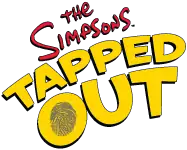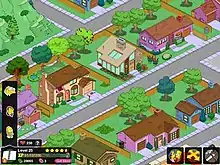| The Simpsons: Tapped Out | |
|---|---|
 Game logo | |
| Developer(s) | EA Mobile |
| Publisher(s) | EA Mobile |
| Engine | Custom |
| Platform(s) | iOS, Android, Kindle Fire |
| Release | iOS Android |
| Genre(s) | City building |
| Mode(s) | Single-player, multiplayer |
The Simpsons: Tapped Out (TSTO), or simply known as Tapped Out, is a freemium licensed city-building mobile game for iOS and Android, based on the American animated comedy television series The Simpsons. It allows users to create and maintain their own version of Springfield using familiar characters and buildings. The game is regularly updated with new content, often seasonal and holiday-themed, for example, during holidays like Thanksgiving, and Treehouse of Horror episodes-related content for Halloween. The game is available in several languages such as English, French, Turkish, Italian, German, Simplified Chinese, Peninsular Spanish and both European Portuguese and Brazilian Portuguese. The game was developed and published by EA Mobile and launched in Europe on February 29, 2012 and in North America on March 1, 2012 for iOS[1] and February 6, 2013 for Android.[2] The game was released for Kindle Fire devices in several markets on June 24, 2013.[3]
According to its own estimates, EA generated over $130 million in revenue since the game's release, as of 2014.[4]
Story
Too busy playing an elf-related game on his myPad at work, Homer Simpson neglects his workstation and accidentally causes a meltdown at the nuclear power plant, leading to a complete destruction of Springfield. Left stranded, he is solely responsible for rebuilding Springfield and bringing back its town members. Homer is desperate to find other characters so that he can get them to rebuild, and he can get back to his elf game. With the help of Lisa, Homer rebuilds Springfield and brings back key sought-out characters.
Gameplay

The Simpsons: Tapped Out is a city-building game.[5] It offers buildings that the player buys with "Money ($)" in-game currency. Premium items are bought with Donuts which can also be purchased with real-world cash. The player uses building and characters to make progress. By completing quests and levels, the player collects more characters and buildings to unlock more quests and levels. Each building generates in-game money to collect, under names such as "Income tax" from houses and the "Marking up Prices" for the Kwik-E-Mart. Players can place rivers, roads, pavement and decorations on the land.
The game is supported by EA's Origin, which acts as a social bridge to where players log into their Origin accounts and visit friends' towns to collect cash every 24 hours.
Since the May 18, 2016 update, the maximum number of levels is 939. This is a reference to the episode A Tale of Two Springfields, which shows the Simpsons' area code.
Content updates have been released for the game, with new game content or limited-time events related to episode promotions or holidays. Major events include a temporary currency, which win the player limited edition prizes.[6][7]
Characters and cast
- Dan Castellaneta – Homer Simpson, Abraham Simpson, Joe Quimby, Groundskeeper Willie, Krusty the Clown, various characters
- Julie Kavner – Marge Simpson, Patty Bouvier, Selma Bouvier & Jaqueline Bouvier
- Nancy Cartwright – Bart Simpson, Maggie Simpson, Nelson Muntz, Ralph Wiggum, various characters
- Yeardley Smith – Lisa Simpson
- Hank Azaria – Moe Szyslak, Chief Wiggum, Apu Nahasapeemapetilon, Professor Frink, Cletus Spuckler, various characters
- Harry Shearer – Mr. Burns, Waylon Smithers, Kent Brockman, Ned Flanders, various characters
- Matt Groening – Himself
Development
According to game runner and longtime Simpsons writer J. Stewart Burns, the game originally started as a "labor of love" and he didn't expect much to happen after the game's release.[5] Although they do not get credited, there are about ten writers who currently work on the game, including Simpsons writers Burns, Matt Selman, Brian Kelley, Jeff Westbrook, Jon Kern, Carolyn Omine and Diana Wright.[5]
In-game problems
Shortly after the iOS launch, the game was pulled from the iOS App Store due to EA's servers being unable to cope with the demand and a plethora of serious glitches reported by users.[8] After a month had passed, EA set up a forum whereby users could report bug issues, but failed to offer solutions to issues or temporary updates. Some users who had made in-app purchases discovered that their purchases had vanished. After contacting EA, users were able to collect refunds directly from Apple. Several months later on August 16, 2012,[9] the app returned to the App Store. The bug remained in the game for some time before eventually being patched.
Reception
The game has a score of 69 out of 100 on Metacritic, indicating "Mixed or average reviews".[10] Daniel Bischoff from GameRevolution summarized their review by saying, "The Simpsons has everything you need for an excellent free-to-play game, including universal appeal, a wealth of material, and excellent little sound bytes like "D'oh" and Krusty's iconic laugh. It's just a shame that Electronics Arts has to choke the life out of that wonder with their oppressive Origin service."[11] Max Eddy from PCMag described the game as "[walking] a delicate line between miserable money-maker and actual entertainment. So far it's done a good job being fun, but it's a balance that's easily upset".[12]
Criticism
Due to criticism of the larger trend of freemium games' revenue structure, the game was satirized in the South Park episode "Freemium Isn't Free" as exploitative and lacking in gameplay.[13] The game itself earlier lampooned this point during an in-game conversation between two characters.[14] In The Simpsons season 25 episode "Labor Pains," Homer opens the game on his phone and is automatically charged $300.
Accolades
The game won the People's Voice Award for "Strategy/Simulation" at the 2018 Webby Awards.[15]
See also
References
- ↑ ""Life-Ruiningly Fun" Comes to iPad, iPhone and iPod touch with the Launch of The Simpsons: Tapped Out". Electronic Arts. January 3, 2012. Archived from the original on March 3, 2018. Retrieved March 24, 2012.
- ↑ "The Simpsons:Tapped Out". February 6, 2013. Archived from the original on February 2, 2017. Retrieved February 6, 2013.
- ↑ "Tapped Out Kindle Edition at Amazon". Amazon. June 24, 2013. Archived from the original on August 5, 2013. Retrieved July 1, 2013.
- ↑ "Electronic Arts Management Discusses Q3 2014 Results - Earnings Call Transcript". Seeking Alpha. January 28, 2014. Archived from the original on February 28, 2021. Retrieved March 7, 2015.
- 1 2 3 "How the Mobile Game Tapped Out Brought Old Simpsons Fans Back Into the Fold". Vulture. September 25, 2014. Archived from the original on September 27, 2014. Retrieved September 26, 2012.
- ↑ "Whack Attack – The Unofficial Simpsons: Tapped Out Blog". tappedoutunofficial.wordpress.com. July 1, 2013. Archived from the original on February 25, 2016. Retrieved December 22, 2013.
- ↑ "The countdown to the final community prize is on! – Tapped Out Daily". tappedoutdaily.wordpress.com. November 1, 2013. Archived from the original on November 26, 2013. Retrieved December 22, 2013.
- ↑ Parfitt, Ben (March 5, 2012). "EA pulls The Simpsons iOS from App Store". MCV. Archived from the original on March 7, 2012. Retrieved March 24, 2012.
- ↑ "THE SIMPSONS: TAPPED OUT RELAUNCHES ON THE APP STORE". August 15, 2012. Archived from the original on July 10, 2016. Retrieved August 17, 2017.
- ↑ "The Simpsons: Tapped Out". Metacritic. Archived from the original on September 3, 2022. Retrieved September 3, 2022.
- ↑ "The Simpsons: Tapped Out Review". GameRevolution. Archived from the original on September 3, 2022. Retrieved September 3, 2022.
- ↑ "The Simpsons: Tapped Out (for iPhone) Review". PCMAG. Archived from the original on September 3, 2022. Retrieved September 3, 2022.
- ↑ ""South Park Trashes "Freemium" Games Like The Simpsons: Tapped Out". CraveOnline. November 6, 2014. Archived from the original on July 22, 2015. Retrieved November 10, 2014.
- ↑ "The Simpsons Tapped Out Is Surprisingly Honest About Freemium Games". Dorkly. August 31, 2014. Archived from the original on April 3, 2015. Retrieved November 10, 2014.
- ↑ "2018 Winners". The Webby Awards. April 24, 2018. Archived from the original on October 15, 2019. Retrieved June 30, 2018.